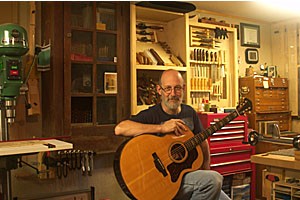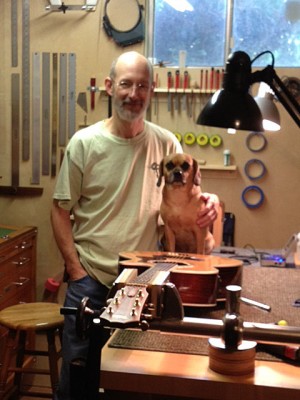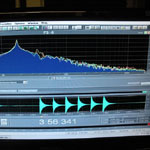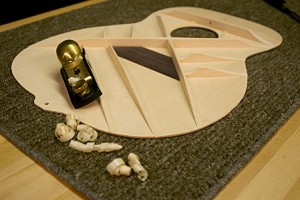 As a craftsman who has worked in wood for the better part of 40 years, I’ve developed a way of approaching fine woodworking that suits my style, pace, and dedication to excellence. I work by myself, alone with my tools and carefully selected woods. I enjoy the break when customers stop in the shop to discuss guitars, but for the most part I revel in the solitude of my shop. Its just me and God, building and working on instruments. (I think that there was a reason why Jesus was a carpenter before He took up His public ministry.) At times, I am joined by my wonderful little dog, Belle, mostly when I have food!
As a craftsman who has worked in wood for the better part of 40 years, I’ve developed a way of approaching fine woodworking that suits my style, pace, and dedication to excellence. I work by myself, alone with my tools and carefully selected woods. I enjoy the break when customers stop in the shop to discuss guitars, but for the most part I revel in the solitude of my shop. Its just me and God, building and working on instruments. (I think that there was a reason why Jesus was a carpenter before He took up His public ministry.) At times, I am joined by my wonderful little dog, Belle, mostly when I have food!
When it comes to guitars and guitar making, I do confess to having some opinions. At 58 years of age, I guess I am now what the kids call an “old guy.” And we all know that old guys have opinions, and that their opinions are right! In all seriousness, I have formed some convictions about life, work, and craft that have a big impact on how I approach guitar making. I believe in honesty and in doing what I do with excellence. I used to say “perfection” but I have come to understand that perfectionism is a disease that can drive one to unhappiness or worse. If, at the end of the day, I have done my work with excellence, then I feel good about things. Tomorrow I will press to do even better, but with the understanding that perfection is a cruel taskmaster. Regarding honesty, a customer recently told me that dealing with me was like being transported back in time to the era when true customer service was the order of the day. That made me feel very good. I never try to sell customers something they don’t need, and sometimes my work on a guitar comes in under my cost estimate and I refund the difference.
 There are a few things associated with modern guitar making and production (these are two different things) that I don’t like. I dislike hype, and when I hear builders and manufacturers making glowing claims about their products that I know aren’t scientifically factual, I bristle a bit. And while modern factory-produced guitars may be well-made (some are and some aren’t), I dislike the idea of computers and robots and lasers making musical instruments. While I do use a computer-assisted method for voicing and tuning my tops and backs, the actual work is done by hand with chisels, planes, and scrapers. There are no CNC made parts on my guitars. Inlays are cut by hand, not by lasers. This does not mean that my guitars are necessarily “better” than those made with CNC parts or laser-cut inlays, but it does mean that when I say “hand made”, the claim is 100% genuine.
There are a few things associated with modern guitar making and production (these are two different things) that I don’t like. I dislike hype, and when I hear builders and manufacturers making glowing claims about their products that I know aren’t scientifically factual, I bristle a bit. And while modern factory-produced guitars may be well-made (some are and some aren’t), I dislike the idea of computers and robots and lasers making musical instruments. While I do use a computer-assisted method for voicing and tuning my tops and backs, the actual work is done by hand with chisels, planes, and scrapers. There are no CNC made parts on my guitars. Inlays are cut by hand, not by lasers. This does not mean that my guitars are necessarily “better” than those made with CNC parts or laser-cut inlays, but it does mean that when I say “hand made”, the claim is 100% genuine.
Lest I begin to sound too much like a curmudgeon, allow me to say what I do like: I like the look, smell, and feel of solid wood. I like well-executed shell inlay and purflings. I like clear, ringing tone with great sustain, rich bass, and sweet treble. I like the look of a hand-made object with its own personality, a reflection of the work that a loving craftsman has imparted to it and that no machine can match. I like tools and the memories that old tools bring to mind when their worn and polished handles are grasped. I like transforming a pile of raw materials into a beautiful musical instrument that can soothe the soul and make the heart glad. I like guitars, and I love building them!
“Machines can go through the motions of making a guitar, but its really more like a guitar-shaped object. Its not really a great guitar. The best guitars are ones that were humanly manipulated to be a great guitar.” –Bill Collings

